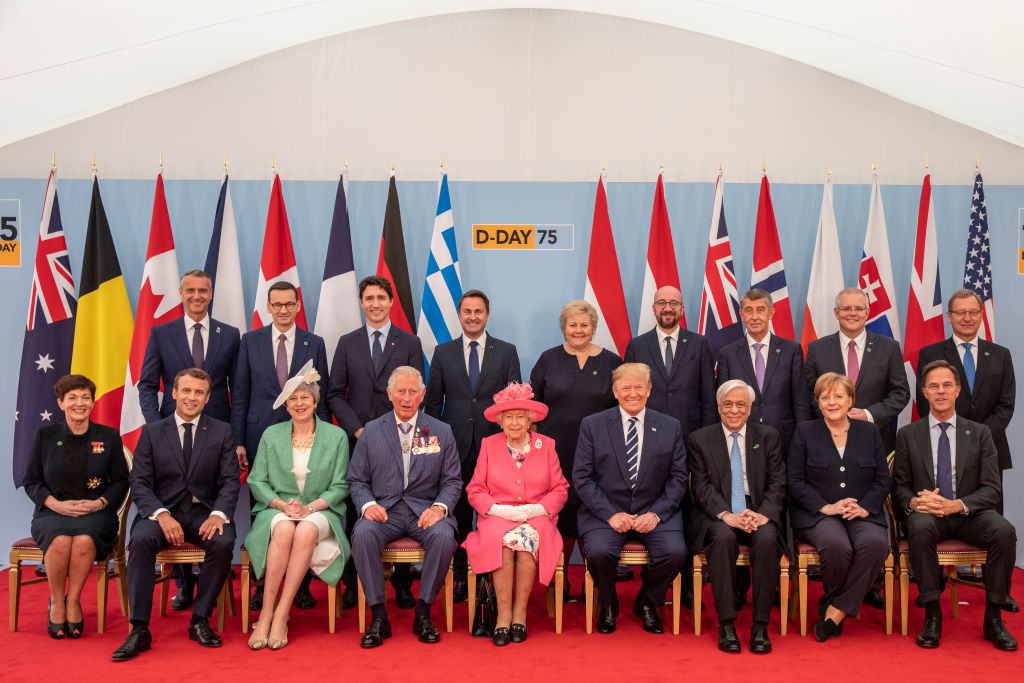In this mailing:
- Con Coughlin: The Transatlantic
Relationship on the 75th Anniversary of D-Day
- Uzay Bulut: Turkey's
"Second Invasion" of Cyprus: Illegal Drilling in
Eastern Mediterranean
by Con Coughlin • June 6, 2019 at
5:00 am
- US officials were
shocked when Angela Merkel said she had no intention of
meeting the target [of minimum defence spending of 2 percent
of GDP] by 2024, but that Germany might be able to reach it by
2030. Given the closeness of Germany's relationship with
Russia, particularly over the construction of the
controversial Nord Stream 2 gas pipeline which will supply
Berlin's energy needs for decades to come, this attitude
suggests Germany is more interested in its relations with
Russia than sustaining the NATO alliance.
- For a president who
is already critical of the Europeans' failure to pay for
defending their continent, this cavalier attitude can hardly
be deemed constructive.
- What the free world
needs is a strong NATO to defend democracy against autocratic
regimes like China and Russia, not one that is distracted by
unnecessary internal squabbles, lest the transatlantic
alliance one day cease to exist.

US
President Donald Trump's attendance at this week's commemorations
to mark the 75th anniversary of the D-Day landings in northern
France comes at a time when the future of the transatlantic
relationship between the US and Europe is under unprecedented
strain. (Image source: Jack Hill - WPA Pool/Getty Images)
US President Donald Trump's attendance at this
week's commemorations to mark the 75th anniversary of
the D-Day landings in northern France comes at a time when the
future of the transatlantic relationship between the US and Europe
is under unprecedented strain.
The Normandy landings, which began on June 6 and
resulted in Allied forces achieving the remarkable feat of
delivering 156,000 troops on to the shores of northern France,
unquestionably represents the high water mark of the transatlantic
relationship.
Not only did it ultimately result in the defeat of
Nazi Germany and end the reign of terror it had instituted over
much of Europe. It also led to the formation of the close alliance
between the Western democracies of the free world in the
existential battle with the Soviet Union during the Cold War.
by Uzay Bulut • June 6, 2019 at
4:00 am
- "Although
Turkey has been violating Cyprus's sovereignty since 1974, the
current highly volatile internal political and economic
situation in Turkey has made the Turkish government get even
more aggressive in the eastern Mediterranean.... For Mr.
Erdogan's plans to succeed, Cyprus needs to be
eliminated." — Harris Samaras, an expert on the Cypriot
EEZ and chairman of the international investment banking firm
Pytheas.
- "Mr. Erdogan is
aware that it will be impossible for Turkey to achieve its
goals of regional hegemony if US interests in particular, but
also French ones, develop a firm foothold in Cyprus. This is
his biggest fear." — Harris Samaras.
- "The East Med
Pipeline, then -- which has been started with the blessing of
the US -- is of the utmost importance. At the last trilateral
meeting of Israel, Cyprus and Greece, US Secretary of State
Mike Pompeo was present and supported the project. If it goes
ahead, it will be a major slap in the face for Turkey's energy
plans." — Harris Samaras.
- "Concrete steps
should be taken to stop Turkish violations against Cyprus's
EEZ. Sanctions should be imposed at the level of the European
Council to the persons and companies responsible for the
drilling. All pre-accession funds to Turkey should be blocked,
and Turkish access to loans by the European Investment Bank
should be eliminated. Additional options, if Turkey escalates
the situation further, are imposing sanctions on Turkey's
banking sector and freezing the accession process altogether.
The US also needs to lift the irrational arms embargo it
imposed on the Republic of Cyprus in 1987, and help it to
rearm and modernize its ability to defend itself, while
keeping the UN peace keeping mission (UNFICYP) intact." —
Theodoros Tsakiris, assistant professor of energy policy and
geopolitics at the University of Nicosia.

According
to Harris Samaras, an expert on the Cypriot EEZ and chairman of the
international investment banking firm Pytheas, "The East Med
Pipeline... is of the utmost importance. At the last trilateral
meeting of Israel, Cyprus and Greece, US Secretary of State Mike
Pompeo was present and supported the project." Pictured:
Israeli Prime Minister Benjamin Netanyahu meets in Jerusalem with
Cypriot President Nicos Anastasiades, Greek Prime Minister Alexis
Tsipras, and US Secretary of State Mike Pompeo, on March 20, 2019.
(Image source: Israel Government Press Office)
Turkey's latest provocation against the Republic of
Cyprus -- drilling for gas in the Cypriot Exclusive Economic Zone
(EEZ) in the eastern Mediterranean -- has elicited harsh reactions
from the international community.
Likening Turkey's encroachment to "a second
invasion," Cypriot President Nicos Anastasiades said that the
action constitutes a "violation of international law;"
his Foreign Ministry submitted a map delineating its EEZ boundaries
with Turkey to the United Nations. In addition, Cypriot Foreign
Minister Nicos Christodoulides said that his government is seeking
an international arrest warrant for the crew of "Fatih,"
the drilling vessel that Ankara dispatched to Cypriot waters.
|































No comments:
Post a Comment